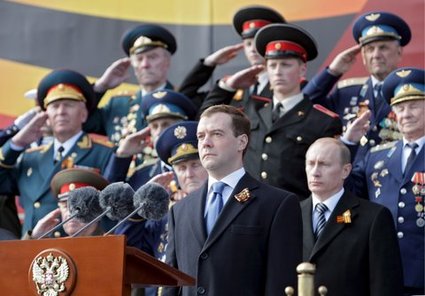
Rewarding Merit in the Russian Officer Corps
Publication: Eurasia Daily Monitor Volume: 7 Issue: 208
By:

Perhaps the most controversial aspect of the Russian defense reform initiated in October of 2008 was its aim to transform the Russian officer corps. Many reform critics and analysts focused upon the planned downsizing of the corps to 150,000 serving officers. However, downsizing alone does not imply genuine reform. In doing so, these reforms initiated the abandoning of mass mobilization, where officers could command “paper units” and transitioned to “permanent readiness brigades” meaning that the command and leadership of skilled officers must evolve to suit the needs of the new structures. A number of signals have coalesced to demonstrate that major change was being contemplated, with profound implications, ranging from the work by Major-General Sergei Pechurov assessing the qualities of officers in the US military, to the planned assembly of officers this month in Moscow to discuss introducing a written code of conduct for a reformed officer corps (EDM, October 7, 2009).
Political, economic and cultural barriers stand between these aspirations, including tackling corruption (EDM, November 9). There will need to be a system of pay and allowances, housing, education and career progression that facilitates the gradual elevation of the officer corps to meet such demanding challenges. However, an underlying issue is how to reboot a system of promotions, particularly among mid-level officers, that is trapped in the past and must reorient towards a new system for selecting and appointing commanders.
This underlying cadre selection issue highlights the problems experienced by the Russian top brass since the reform began linked to the difficulties in finding suitable and promising brigade commanders. The Chief of the General Staff, Army-General Nikolai Makarov, noted that even at the interview stage, potential brigade commanders admit uncertainty about their ability to command. Consequently, the military leadership has struggled to overcome these deeper weaknesses within the system of officer career progression. In a critical article in Voyenno Promyshlennyy Kuryer, Lieutenant-Colonel of Justice, Sergei Romanov, reviewed the fundamental drawbacks in the existing selection and promotion of officers and called for a root and branch overhaul that would complement the demands of the “new look” (Voyenno Promyshlennyy Kuryer, November 4).
According to current legislation, assigning officers to posts is accomplished in response to orders from a unit commander or a higher officer. A lieutenant-colonel (or captain second class) must have the appropriate order signed by the military district or fleet commander, who obviously cannot know the officer in question. Documents are then prepared in lower level bodies, including a submission from the unit commander where the officer serves, a decision by a certification board and occasionally the officer’s personal case. The unit commander has the final say on whether promotion is granted, and if the officer is applying for a post outside his unit the process becomes exponentially more complex. Searching for a vacancy usually through word of mouth, eventually traveling to the desired unit and, if successful, an officer may secure a memorandum to review his candidacy. “A commander is not responsible for the career growth of his subordinates and no one praises or punishes him for this, but under the entire program they ask that the unit fulfills its daily missions and that it is staffed with skilled, competent people,” Romanov explained (Voyenno Promyshlennyy Kuryer, November 4).
The current system is overly decentralized and allows the unit commander to play a pivotal role, as well as creating an artificial division among officers. It is simpler to secure promotion within an officer’s own unit than obtain promotion elsewhere. Consequently, many Russian officers lack a broader, rounded service experience due to the absence of rotation, while entire categories of “unpromising posts” exist in “unpromising units,” depriving officers of access to career progression. Romanov noted that such “unpromising units” fail to attract career minded officers as a rule have the lowest morale and discipline standards. “Capable people in shoulder boards leave the armed forces having been deprived of the main incentive of an officer’s career, prospects for career growth. In many cases, those who are less deserving are advanced upwards through the cadre hierarchy. In the final analysis, all of this has a profoundly negative impact upon the entire army and inhibits its full-value development,” Romanov lamented.
In essence the fundamental weakness in the system of officer selection and career advancement is that it fails to harness and develop the best officers: it lacks a basis in merit. Romanov understands that in the context of the reform, this must change, and advocated adopting a merit-based cadre system that would rectify these deficiencies. Again, like other aspects of the reform agenda, Romanov drew upon foreign military experience, and in this case specifically recommending adopting elements of the US model: “A cadre selection system, which is based upon such a principle under the designation of top or out, is now in place in the US armed forces. In this model, an officer’s service is broken down into periods of two to three years, during which information about the person is constantly being accumulated. Each year out of all those who have served their time in grade, a selection is made for top posts, and those who are unworthy for promotion are discharged” (Voyenno Promyshlennyy Kuryer, November 4).
Transforming the pre-reform officer corps from a principle of retaining them at all costs, with decentralized and opaque decision making, towards a modernized cadre system based on merit and ensuring rounded experience through rotation as well as access to genuine career growth will necessitate further reform. Romanov believes this must centralize cadre selection, develop a universal and objective system to assess officer skills and qualities, maximize the number of candidates applying for promotion, ensure officer rotation and offer equal chances for promotion open to all officers.
State Secretary-Deputy Defense Minister, Nikolay Pankov, confirmed that in 2011 the military educational establishments will graduate approximately 15,000 lieutenants, with an addition 15,000 in 2012 and 10,000 the following year; over a three year period 40,000 graduate lieutenants must be assigned posts (Rossiyskaya Gazeta, October 27). The defense ministry is concentrating on reforming the military education system and completing the downsizing of the officer corps, while Romanov’s article reminds the senior leadership that further change will prove necessary otherwise the most promising of these young officers may hemorrhage from the “new look” armed forces in search of civilian careers.




